By K. Gopalakrishnan
There is a rare interesting picture taken at Picanol’s Ypres factory in Belgium in 1960, which shows an Indian Sardar working in the plant for weaving machines. Another picture taken in 1961 shows Picanol machine getting unloaded at one of the Indian mills. It just goes to show the long association the Picanol Group has had with India and the Indian textile industry. Picanol’s association with India dates back to 1956 when the first machines arrived. Since then, there have been many milestones in the long history of the company.
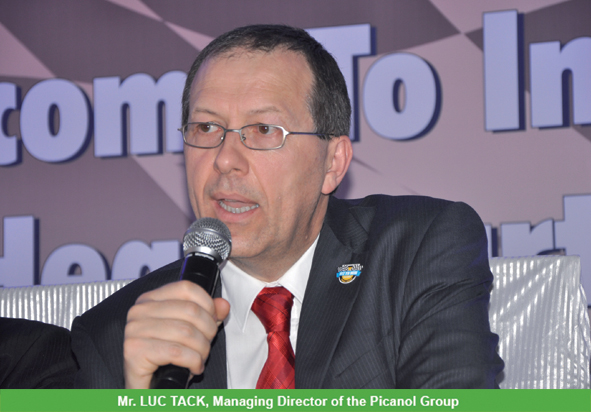 But August 3, 2012, was a red letter day in the history of Picanol. It is on this day that Picanol started a new chapter in its history by inaugurating the Indian headquarters in New Delhi. Picanol has created this infrastructure for the Indian market considering its long-term plans and objectives. The new office is located right in the heart of the capital in a state-of-the-art business center.
But August 3, 2012, was a red letter day in the history of Picanol. It is on this day that Picanol started a new chapter in its history by inaugurating the Indian headquarters in New Delhi. Picanol has created this infrastructure for the Indian market considering its long-term plans and objectives. The new office is located right in the heart of the capital in a state-of-the-art business center.
The new office was inaugurated by the Deputy Prime Minister of Belgium and Minister of Foreign Affairs, Mr. Didier Reynders. It clearly goes to show the strong commitment of Picanol to the Indian textile industry. The other dignitaries present at the inaugural ceremony were Mr. Pierre Vaesen, Ambassador of Belgium to India. Mr. Luc Tack, Managing Director of the Picanol Group, and Mr. Kamal Oswal, Vice Chairman of Nahar Industrial Group.
Mr. Luc Tack said on the occasion: “The opening of our new Indian headquarters represents another milestone in the long history of Picanol. As India is not only one of the key textile markets in the world, it is also a market of crucial strategic importance to Picanol. Today, we are celebrating the official opening of our new headquarters in New Delhi. But our ambition does not stop here. With the broadest product range in the market, improved local services and presence, Picanol remains highly committed to India and plans to increase its leadership in weaving systems for the entire Indian weaving sector.
Picanol has been successfully serving the Indian market since 1956. It is interesting to note that some of the machines supplied in the 1950s and 1960s are still running in mills like President Mills and Madura Mills. The company was initially operating through agents till 2008 when it decided to establish an Indian subsidiary in view of the potential and expected growth of the Indian market.
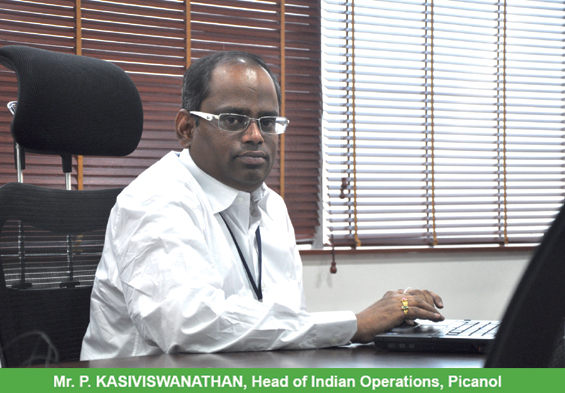 Since then, Picanol India, headed by Mr. Palanisamy Kasiviswanathan, has been looking after local sales and service activities. Today, the company is focusing on sales of Picanol weaving machines, installation and commissioning of machines, complete service and sales of original Picanol spare parts and accessories and repairing of PCBs for the repair of electronic circuit boards of Picanol looms.
Since then, Picanol India, headed by Mr. Palanisamy Kasiviswanathan, has been looking after local sales and service activities. Today, the company is focusing on sales of Picanol weaving machines, installation and commissioning of machines, complete service and sales of original Picanol spare parts and accessories and repairing of PCBs for the repair of electronic circuit boards of Picanol looms.
Mr. Kasiviswanathan says: “We are excited to expand our operations and move to a new facility. With the broadest product range on the market, improved local services and considerable presence, Picanol remains highly committed to India and plans to be the leading provider of weaving systems for the entire Indian weaving sector. We appreciate all of the support that we have received from both the State and local officials, and would therefore like to express our utmost gratitude to the Belgian and Indian government representatives for the excellent co-operation in India”.
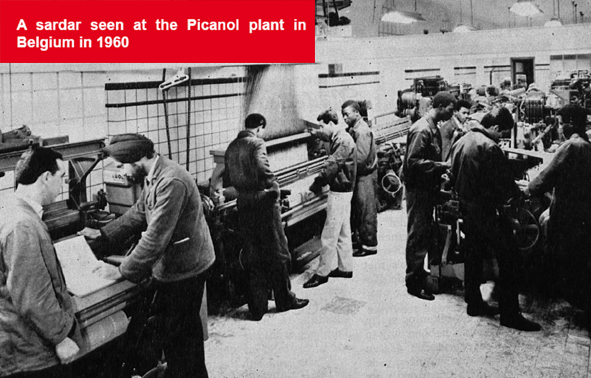 In recent years, Picanol India has seen a steady growth in its market share, which has led to it becoming the leading provider of weaving machines on the local market today. India is a market of crucial importance for Picanol as it is one of the key textile markets in the world.
In recent years, Picanol India has seen a steady growth in its market share, which has led to it becoming the leading provider of weaving machines on the local market today. India is a market of crucial importance for Picanol as it is one of the key textile markets in the world.
As part of its further growth plans, Picanol India purchased new headquarters in downtown New Delhi at the end of 2011. The print repair shop and the office, which were located in separate buildings, have been brought together in the new building. The inauguration of the new offices marks a major milestone for Picanol in India. Picanol India also has regional offices in Mumbai and Coimbatore and currently employs 35 people.
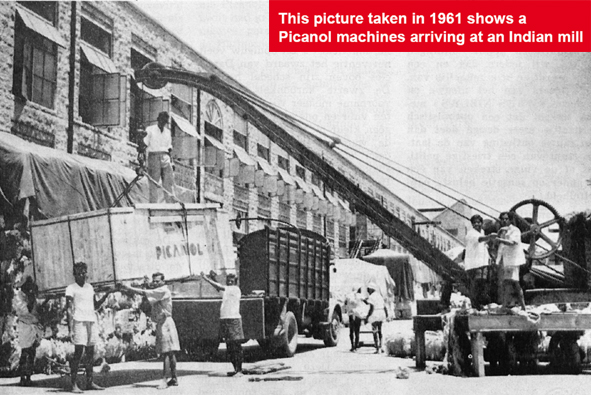 Mr. Luc Tack says: “Over the last seven-and-a-half decades the Picanol Group has played a pioneering role as developer and manufacturer of highly productive weaving systems. In 1971 we were the first in the world to introduce the electronically controlled weaving machine. We were also the first weaving machine manufacturer in the world to get ISO 9001 certification. In recent decades, together with our customers, we have constantly pushed our limits with regard to weaving machines, which has taken us to the leading position amongst world weaving machine manufacturers”.
Mr. Luc Tack says: “Over the last seven-and-a-half decades the Picanol Group has played a pioneering role as developer and manufacturer of highly productive weaving systems. In 1971 we were the first in the world to introduce the electronically controlled weaving machine. We were also the first weaving machine manufacturer in the world to get ISO 9001 certification. In recent decades, together with our customers, we have constantly pushed our limits with regard to weaving machines, which has taken us to the leading position amongst world weaving machine manufacturers”.
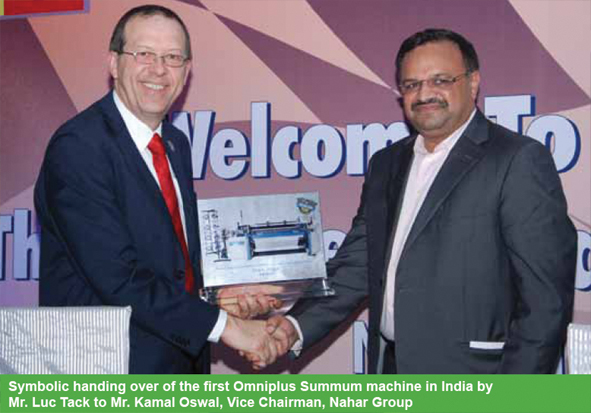 Currently, nearly 2,600 weaving mills worldwide have chosen Picanol weaving machines, with over 130,000 machines running worldwide. In 2011 the company clocked a turnover of Euro 466 million. The company employs 1,900 persons.
Currently, nearly 2,600 weaving mills worldwide have chosen Picanol weaving machines, with over 130,000 machines running worldwide. In 2011 the company clocked a turnover of Euro 466 million. The company employs 1,900 persons.
Picanol provides complete weaving solutions for the apparel, household and technical textile industry. It also offers a wide range of weaving machines to cater to all possible requirements. Picanol has more than 15,000 machines working in customer locations across India. The increase in the number of Picanol machines in India prompted the company to establish a sales and service organization to interact with customers directly and serve them better.
An important highlight of the inaugural event was the presence of Mr. Kamal Oswal, Vice Chairman, Nahar Group. The event marked the formal handing over of the first Picanol OmniplusSummum machines to the Nahar Group, which has placed a major order for the new range of machines.
Mr. Kamal Oswal said: “We have been associated with the Picanol Group since 1995 when we started with 72 looms. Now we have around 1,000 looms. We are very satisfied with the performance of Picanol machines because of its innovation and reliability. I congratulate Picanol on inauguration of the new facility”.
 Asked about the outlook for the Indian textile industry, Mr. Luc Tack said: “The outlook for the Indian textile industry is very good. In the next 10 years, we expect 500 million people worldwide to come out of poverty and this will drive demand in the textile industry particularly for markets like India which can capture a part of this potential. Also the growing domestic market and equal growth in exports will benefit the Indian textile industry. I am very bullish on the Indian textile industry in the long term”.
Asked about the outlook for the Indian textile industry, Mr. Luc Tack said: “The outlook for the Indian textile industry is very good. In the next 10 years, we expect 500 million people worldwide to come out of poverty and this will drive demand in the textile industry particularly for markets like India which can capture a part of this potential. Also the growing domestic market and equal growth in exports will benefit the Indian textile industry. I am very bullish on the Indian textile industry in the long term”.
Mr. Kasiviswanathan observed: “The Indian Government is providing a lot of encouragement for the upgradation of the weaving sector. For the first time, in 2012, the customs duties have been completely removed for weaving machines without any export obligation. Also under TUFS there is 10% capital subsidy. The potential for weaving machines is huge as the Government is encouraging the weaving segment even in the decentralized markets like Bhiwandi and Ichalkaranji to go for technology upgradation. India is in the best position for taking the lead in the weaving segment”.
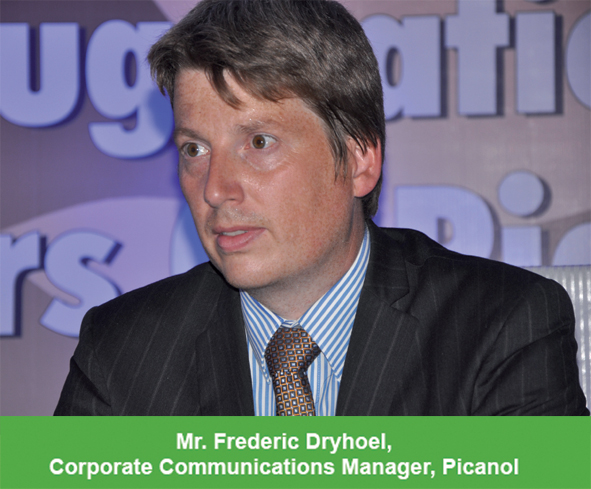 Despite the slowdown in global economy and the Eurozone crisis, Picanol continues to do well. The global market for textile industry and in particular for weaving machines is not so strong at the moment, but Picanol has been outperforming in such a scenario. In fact, the company has recently announced hiring of people at its Ypres facility to support the increase in production due to good order intake from many global markets. The new OmniplusSummum range launched at ITMA in 2011 has been very successful. India is the second largest market for Picanol, next only to China.
Despite the slowdown in global economy and the Eurozone crisis, Picanol continues to do well. The global market for textile industry and in particular for weaving machines is not so strong at the moment, but Picanol has been outperforming in such a scenario. In fact, the company has recently announced hiring of people at its Ypres facility to support the increase in production due to good order intake from many global markets. The new OmniplusSummum range launched at ITMA in 2011 has been very successful. India is the second largest market for Picanol, next only to China.
The new Indian headquarters of Picanol is not just a corporate office. It has a fully equipped electronic PCB repair shop with experienced service engineers. The repair shop takes care of the requirement of the customers across India. “Our print repair Centre is fully equipped to handle the prints of even 25 year old looms supplied in India. The responsibility to provide service and technical support rests on Picanol India”, Mr. Kasiviswanathan assures.
 Another important function housed in the new office is the Central Spare parts ordering department. Spare parts orders are placed from here on real time basis online to the warehouse in Belgium, and they are shipped immediately from there directly to the customer anywhere in India.
Another important function housed in the new office is the Central Spare parts ordering department. Spare parts orders are placed from here on real time basis online to the warehouse in Belgium, and they are shipped immediately from there directly to the customer anywhere in India.
 “I am convinced that Picanol has all it takes to contribute to the further expansion of the Indian textile industry. As the Managing Director, I will make sure that we will continue to deliver the best weaving machines and the highest services to our valued Indian customers. Because, after all, our success depends on the success of our customers”, added Mr. Luc Tack.
“I am convinced that Picanol has all it takes to contribute to the further expansion of the Indian textile industry. As the Managing Director, I will make sure that we will continue to deliver the best weaving machines and the highest services to our valued Indian customers. Because, after all, our success depends on the success of our customers”, added Mr. Luc Tack.